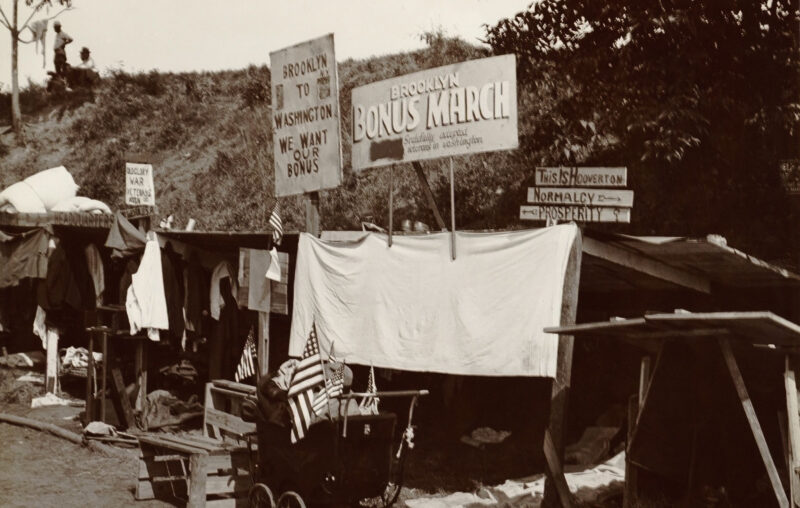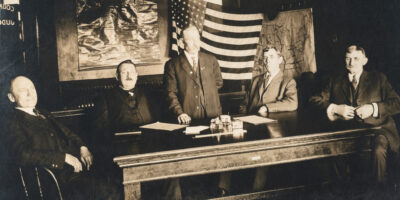College History Textbooks spread Misinformation about the Great Depression

The Great Depression was the most significant macroeconomic event of the past century, but don’t expect to find an accurate portrayal of its causes in your college history classroom. The most commonly assigned college-level US history textbooks contain obsolete and economically erroneous explanations of the 1929 stock market crash and its aftermath.
In a new study I co-authored with Jeremy Horpedahl and Marcus Witcher, we examined nine widely used US history textbooks and evaluated their accounts of the Great Depression. We then compared those narratives to assessments of the same event by economists and economic historians. The results show that historians are largely unaware of the leading economic explanations for the Depression.
Most economists attribute the crash to a decade-long quagmire to a series of bad economic policy decisions in the 1920s and ’30s. As former Federal Reserve chairman Ben Bernanke conceded, the Fed is now widely recognized as having botched its response to the unfolding events of 1929-1933. Through a string of erroneous policy decisions and inaction, the Fed created the conditions for a monetary contraction and directly exacerbated a collapse of the banking system. Other policy blunders, such as the steeply protectionist Smoot-Hawley Tariff of 1930, added fuel to the fire by triggering a global collapse in international trade. And in 1932, President Herbert Hoover signed a massive hike in federal income tax rates in a misguided attempt to close the budget deficit. Contractionary fiscal policy during a Depression is seldom a good idea.
Other “consensus” economic explanations of the Depression do borrow elements of Keynesian theory, suggesting that the 1929 crash and aftermath illustrated a contraction in aggregate demand. This proposition has been heavily contested since Keynes first advanced it in the 1930s, but it remains a part of mainstream economic theory. To illustrate the range of economic explanations for the Great Depression, we summarized ten of the most commonly used college-level economics textbooks below.
Turning to the nine most-common US history textbooks, we found a very different story. Monetary explanations of the Great Depression were seldom mentioned at all. Only two of the nine texts mentioned the role of Federal Reserve policies. The protectionist policies of Smoot-Hawley were largely omitted. US history textbooks even neglected doctrinaire Keynesian explanations rooted in an aggregate demand contraction.
Instead, all nine history textbooks attributed the Great Depression to a class of explanations known as “underconsumption” theory. Briefly summarized, underconsumption holds that economic production outpaced what most consumers could purchase given their low pay, triggering a contractionary event in the form of the Depression. This argument attained popularity in the early 1930s, and was used to justify many of the economic planning and regulatory programs of Franklin Delano Roosevelt’s New Deal. Economists today overwhelmingly reject “underconsumption” theory. Even Keynes expressed skepticism of the notion, and attempted to prod the Roosevelt administration over to an aggregate-demand-based theory of the unfolding events. For the past 80 years, few if any economists have seriously entertained “underconsumption” as a viable explanation of the Great Depression.
As our study shows, US history textbook authors remain badly out-of-touch with the economic literature about the Depression. They also augment their obsolete “underconsumption” explanation with other political appeals.
Eight out of nine US history textbooks attributed the Great Depression to rising income inequality. Only one economics textbook made a similar argument, the explicitly heterodox CORE open access e-book. Tellingly, none of the history textbooks offered a coherent causal mechanism by which inequality supposedly caused or triggered the Great Depression. They simply asserted it to be the case.
The table below shows the range of causes listed in the nine US history textbooks. Note that it contains barely any overlap with the depiction of the same events by economists.
So what are we to make of this odd situation? The comparison of the two charts shows that US history instruction, including at the college level, is badly out of sync with the scholarly literature on the Great Depression. History textbooks show little cognizance of the leading economic explanations for this famous event, and display almost no awareness of how this literature has developed over the past 80 years.
The resulting treatment of the Great Depression in US history textbooks does little to educate students about the actual causes of the Great Depression. It does, however, privilege obsolete political arguments from the early 1930s that were used to justify the New Deal.










